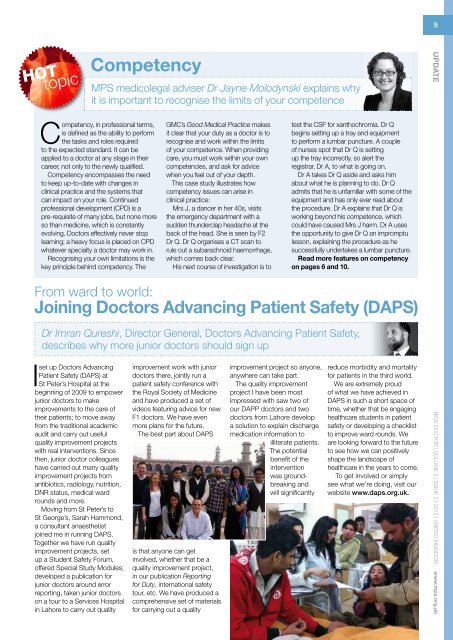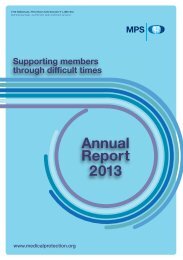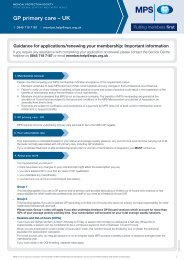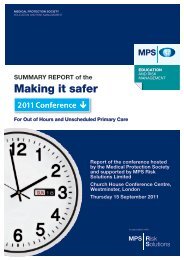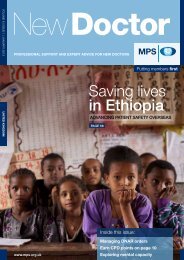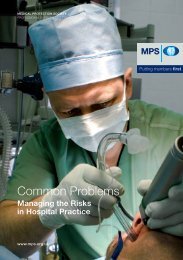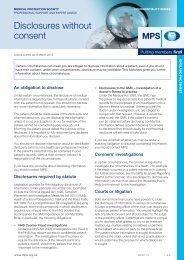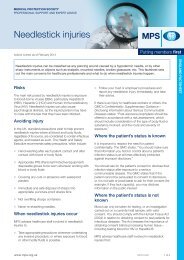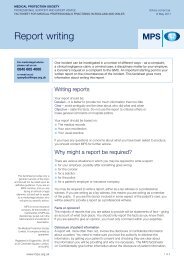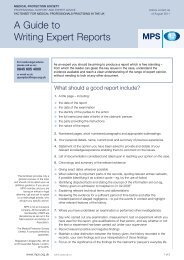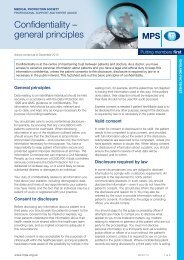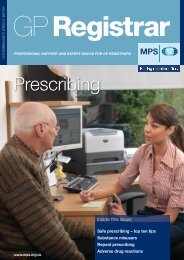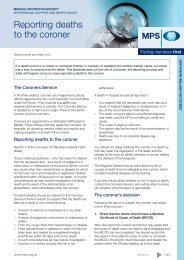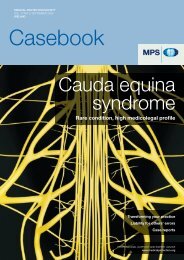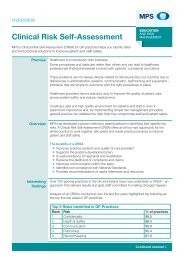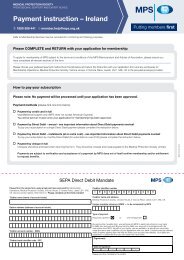New Doctor - Medical Protection Society
New Doctor - Medical Protection Society
New Doctor - Medical Protection Society
Create successful ePaper yourself
Turn your PDF publications into a flip-book with our unique Google optimized e-Paper software.
Competency, in professional terms,<br />
is defined as the ability to perform<br />
the tasks and roles required<br />
to the expected standard. It can be<br />
applied to a doctor at any stage in their<br />
career, not only to the newly qualified.<br />
Competency encompasses the need<br />
to keep up-to-date with changes in<br />
clinical practice and the systems that<br />
can impact on your role. Continued<br />
professional development (CPD) is a<br />
pre-requisite of many jobs, but none more<br />
so than medicine, which is constantly<br />
evolving. <strong>Doctor</strong>s effectively never stop<br />
learning; a heavy focus is placed on CPD<br />
whatever specialty a doctor may work in.<br />
Recognising your own limitations is the<br />
key principle behind competency. The<br />
I<br />
set up <strong>Doctor</strong>s Advancing<br />
Patient Safety (DAPS) at<br />
St Peter’s Hospital at the<br />
beginning of 2009 to empower<br />
junior doctors to make<br />
improvements to the care of<br />
their patients; to move away<br />
from the traditional academic<br />
audit and carry out useful<br />
quality improvement projects<br />
with real interventions. Since<br />
then, junior doctor colleagues<br />
have carried out many quality<br />
improvement projects from<br />
antibiotics, radiology, nutrition,<br />
DNR status, medical ward<br />
rounds and more.<br />
Moving from St Peter’s to<br />
St George’s, Sarah Hammond,<br />
a consultant anaesthetist<br />
joined me in running DAPS.<br />
Together we have run quality<br />
improvement projects, set<br />
up a Student Safety Forum,<br />
offered Special Study Modules,<br />
developed a publication for<br />
junior doctors around error<br />
reporting, taken junior doctors<br />
on a tour to a Services Hospital<br />
in Lahore to carry out quality<br />
Competency<br />
MPS medicolegal adviser Dr Jayne Molodynski explains why<br />
it is important to recognise the limits of your competence<br />
GMC’s Good <strong>Medical</strong> Practice makes<br />
it clear that your duty as a doctor is to<br />
recognise and work within the limits<br />
of your competence. When providing<br />
care, you must work within your own<br />
competencies, and ask for advice<br />
when you feel out of your depth.<br />
This case study illustrates how<br />
competency issues can arise in<br />
clinical practice:<br />
Mrs J, a dancer in her 40s, visits<br />
the emergency department with a<br />
sudden thunderclap headache at the<br />
back of the head. She is seen by F2<br />
Dr Q. Dr Q organises a CT scan to<br />
rule out a subarachnoid haemorrhage,<br />
which comes back clear.<br />
His next course of investigation is to<br />
test the CSF for xanthochromia. Dr Q<br />
begins setting up a tray and equipment<br />
to perform a lumbar puncture. A couple<br />
of nurses spot that Dr Q is setting<br />
up the tray incorrectly, so alert the<br />
registrar, Dr A, to what is going on.<br />
Dr A takes Dr Q aside and asks him<br />
about what he is planning to do. Dr Q<br />
admits that he is unfamiliar with some of the<br />
equipment and has only ever read about<br />
the procedure. Dr A explains that Dr Q is<br />
working beyond his competence, which<br />
could have caused Mrs J harm. Dr A uses<br />
the opportunity to give Dr Q an impromptu<br />
lesson, explaining the procedure as he<br />
successfully undertakes a lumbar puncture.<br />
Read more features on competency<br />
on pages 6 and 10.<br />
From ward to world:<br />
Joining <strong>Doctor</strong>s Advancing Patient Safety (DAPS)<br />
Dr Imran Qureshi, Director General, <strong>Doctor</strong>s Advancing Patient Safety,<br />
describes why more junior doctors should sign up<br />
improvement work with junior<br />
doctors there, jointly run a<br />
patient safety conference with<br />
the Royal <strong>Society</strong> of Medicine<br />
and have produced a set of<br />
videos featuring advice for new<br />
F1 doctors. We have even<br />
more plans for the future.<br />
The best part about DAPS<br />
is that anyone can get<br />
involved, whether that be a<br />
quality improvement project,<br />
in our publication Reporting<br />
for Duty, international safety<br />
tour, etc. We have produced a<br />
comprehensive set of materials<br />
for carrying out a quality<br />
improvement project so anyone,<br />
anywhere can take part.<br />
The quality improvement<br />
project I have been most<br />
impressed with saw two of<br />
our DAPP doctors and two<br />
doctors from Lahore develop<br />
a solution to explain discharge<br />
medication information to<br />
illiterate patients.<br />
The potential<br />
benefit of the<br />
intervention<br />
was groundbreaking<br />
and<br />
will significantly<br />
reduce morbidity and mortality<br />
for patients in the third world.<br />
We are extremely proud<br />
of what we have achieved in<br />
DAPS in such a short space of<br />
time, whether that be engaging<br />
healthcare students in patient<br />
safety or developing a checklist<br />
to improve ward rounds. We<br />
are looking forward to the future<br />
to see how we can positively<br />
shape the landscape of<br />
healthcare in the years to come.<br />
To get involved or simply<br />
see what we’re doing, visit our<br />
website www.daps.org.uk.<br />
5<br />
UPDATE<br />
NEW DOCTOR | VOLUME 5 | ISSUE 2 | 2012 | UNITED KINGDOM www.mps.org.uk


